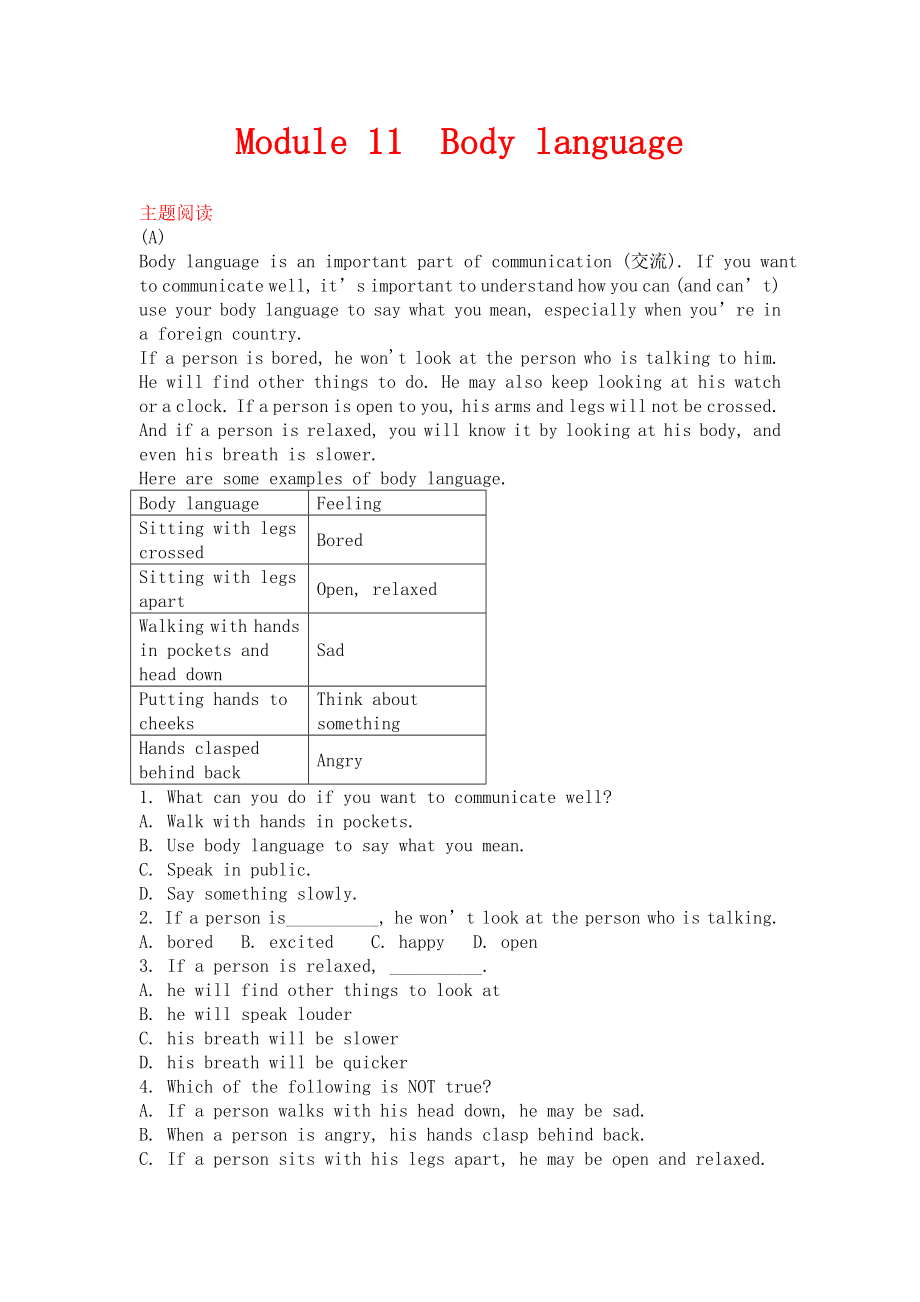《外研版英語(yǔ)七年級(jí)下冊(cè)Module 11《Body language》主題閱讀練習(xí)》由會(huì)員分享����,可在線閱讀,更多相關(guān)《外研版英語(yǔ)七年級(jí)下冊(cè)Module 11《Body language》主題閱讀練習(xí)(3頁(yè)珍藏版)》請(qǐng)?jiān)谘b配圖網(wǎng)上搜索�����。
1����、Module 11 Body language 主題閱讀(A)Body language is an important part of communication (交流). If you want to communicate well, its important to understand how you can (and cant) use your body language to say what you mean, especially when youre in a foreign country.If a person is bored, he wont look at t
2、he person who is talking to him. He will find other things to do. He may also keep looking at his watch or a clock. If a person is open to you, his arms and legs will not be crossed. And if a person is relaxed, you will know it by looking at his body, and even his breath is slower.Here are some exam
3�����、ples of body language. Body languageFeelingSitting with legs crossedBoredSitting with legs apartOpen, relaxedWalking with hands in pockets and head downSadPutting hands to cheeksThink about somethingHands clasped behind backAngry1. What can you do if you want to communicate well?A. Walk with hands i
4�、n pockets.B. Use body language to say what you mean.C. Speak in public.D. Say something slowly.2. If a person is_, he wont look at the person who is talking.A. bored B. excited C. happy D. open3. If a person is relaxed, _.A. he will find other things to look atB. he will speak louderC. his breath wi
5、ll be slowerD. his breath will be quicker4. Which of the following is NOT true?A. If a person walks with his head down, he may be sad.B. When a person is angry, his hands clasp behind back.C. If a person sits with his legs apart, he may be open and relaxed.D. If a person puts his hands to cheeks, he
6�、 may want to sing a song.5. What is the best title for the passage?A. Communication B. Body LanguageC. Some Feelings D. Health Problem(B)People in different countries greet each other in different ways. Here are some. a b c dThe United StatesPeople shake hands when they meet for the first time. Frie
7、nds and family members often hug or kiss on the cheek (臉頰) when they see each other.Korea (韓國(guó))Men bow and shake hands to greet each other. Women do not usually shake hands. If you address someone, you use his or her full name. The family name comes first, then the first name.Finland (芬蘭)Finns (芬蘭人)
8���、greet each other with a handshake. Hugs and kisses are only for close friends and family members. The Philippines (菲律賓)The everyday greeting for friends is a handshake for both men and women. Men sometimes pat (輕拍) each other on the back.1. In which country do men sometimes pat each other on the bac
9��、k?A. The Philippines. B. Finland.C. Korea. D. The United States.2. Of the four pictures (a, b, c, d) , which is the same way to greet each other in the four countries? A. d B. e C. b D. a3. In this passage, all the following are mentioned EXCEPT (除了之外) _.A. kisses B. hugs C. smiles D. handshakes4. What does the writer want to tell us in the passage?A. Different ways of greeting.B. Four countries.C. Friends and family members.D. Languages.主題閱讀(A) 15 BACDB(B) 14 ADCA
 外研版英語(yǔ)七年級(jí)下冊(cè)Module 11《Body language》主題閱讀練習(xí)
外研版英語(yǔ)七年級(jí)下冊(cè)Module 11《Body language》主題閱讀練習(xí)

